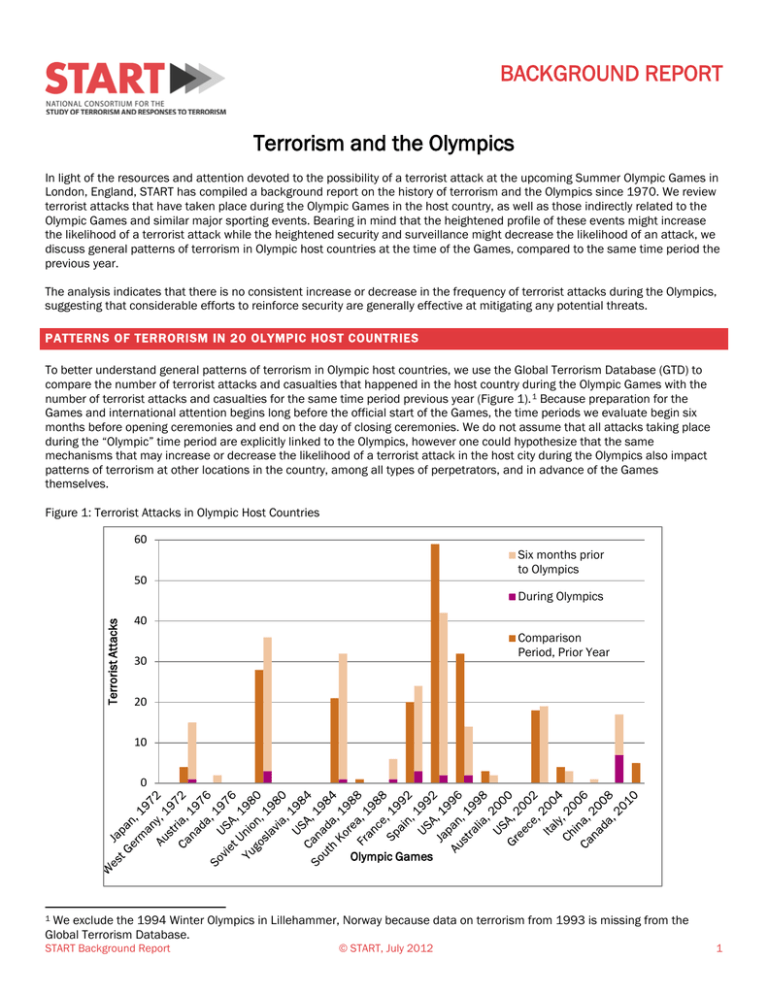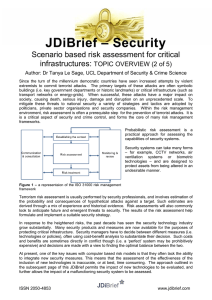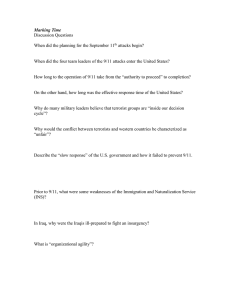BACKGROUND REPORT Terrorism and the Olympics
advertisement

BACKGROUND REPORT Terrorism and the Olympics In light of the resources and attention devoted to the possibility of a terrorist attack at the upcoming Summer Olympic Games in London, England, START has compiled a background report on the history of terrorism and the Olympics since 1970. We review terrorist attacks that have taken place during the Olympic Games in the host country, as well as those indirectly related to the Olympic Games and similar major sporting events. Bearing in mind that the heightened profile of these events might increase the likelihood of a terrorist attack while the heightened security and surveillance might decrease the likelihood of an attack, we discuss general patterns of terrorism in Olympic host countries at the time of the Games, compared to the same time period the previous year. The analysis indicates that there is no consistent increase or decrease in the frequency of terrorist attacks during the Olympics, suggesting that considerable efforts to reinforce security are generally effective at mitigating any potential threats. PATTERNS OF TERRORISM IN 20 OLYMPIC HOST COUNTRIES To better understand general patterns of terrorism in Olympic host countries, we use the Global Terrorism Database (GTD) to compare the number of terrorist attacks and casualties that happened in the host country during the Olympic Games with the number of terrorist attacks and casualties for the same time period previous year (Figure 1). 1 Because preparation for the Games and international attention begins long before the official start of the Games, the time periods we evaluate begin six months before opening ceremonies and end on the day of closing ceremonies. We do not assume that all attacks taking place during the “Olympic” time period are explicitly linked to the Olympics, however one could hypothesize that the same mechanisms that may increase or decrease the likelihood of a terrorist attack in the host city during the Olympics also impact patterns of terrorism at other locations in the country, among all types of perpetrators, and in advance of the Games themselves. Figure 1: Terrorist Attacks in Olympic Host Countries 60 Six months prior to Olympics 50 Terrorist Attacks During Olympics 40 Comparison Period, Prior Year 30 20 10 0 Olympic Games We exclude the 1994 Winter Olympics in Lillehammer, Norway because data on terrorism from 1993 is missing from the Global Terrorism Database. 1 START Background Report © START, July 2012 1 Overall, the locations of the Olympic Games are quite safe with respect to terrorism. In five Olympic venues there were no terrorist attacks reported in the GTD during the Olympics, six months prior to the Olympics, or during the same time period the previous year. These locations include Japan 1972, Canada 1976, Soviet Union 1980, Yugoslavia 1984 and Australia 2000. Additionally, in South Korea and Canada in 1988, Japan in 1998, Greece in 2004 and Canada 2010, there were no fatal attacks recorded during any of the time periods we examined. The location with the greatest number of attacks during the actual Olympic Games is China 2008, with seven. The location with the greatest number of fatalities during the Olympic Games is West Germany 1972 with 16 and the most injuries took place in the United States in 1996 with 110. The Olympic host country that experienced the most attacks during both the Olympic period and the comparison period was Spain 1992. Although the numbers of attacks in these locations are generally low, four locations experienced terrorist attacks during the Olympic period, but not during the comparison period the year before (Austria 1976, South Korea 1988, Italy 2006 and China 2008). Two others -- Canada in 1988 and Canada in 2010 -- experienced attacks during the comparison period the prior year but not during the Olympic period. Of the 15 countries that experienced any attacks during the time periods we analyzed, nine had a higher number of attacks during the Olympic period than the comparison period. Of these nine cases, six took place in 1992 or earlier. Six venues had a lower number of attacks during the Olympic period. All six cases in which there were fewer attacks at the time of the Olympics than the year prior took place since 1988. Note, however, that these findings are generally consistent with temporal patterns in terrorism worldwide, which increase from the 1970s through the early 1990s, decrease in the mid-1990s and early 2000s, and increase in the mid-2000s. Due to the fact that fatal attacks in Olympic locations are rare and fatality statistics are heavily influenced by atypical events such as the 1995 Oklahoma City bombing and the 2001 attacks on September 11 in the United States, no clear pattern emerges regarding the relative lethality of attacks that take place in the context of the Olympics. In three locations the total number of fatalities during the Olympic period was lower than the comparison period the previous year. In six locations, the total number of fatalities during the Olympic period was higher than the comparison period. OLYMPICS-RELATED ATTACKS Since 1970 there have been a number of attacks directly and indirectly related to the Olympic Games and other major sporting events. These include attacks that occurred during the competition as well as attacks on officials, athletes, tourists, venues and crowds of viewers. FATAL ATTACKS DURING THE OLYMPICS There have been lethal attacks in three host cities during the Olympic Games. These include the 1972 Munich attack, the 1996 Atlanta attack and two attacks during the 2008 Beijing Games. The perpetrators of these attacks represent a variety of ideological influences. Combined, they resulted in the deaths of 16 victims and six perpetrators. More than 100 people were wounded. 1972 MUNICH On Sept. 5, 1972 eight assailants from the Palestinian Black September Organization broke into an apartment complex housing the Israeli Olympic team. Initially, two members of the team were killed and nine others were taken hostage. After a daylong standoff during which the hostage-takers demanded Israel release more than 200 Palestinian prisoners, the terrorists and hostages travelled by bus and helicopter to a nearby air base where a plane was waiting. At the air base, police opened fire and a shootout took place during which one of the perpetrators detonated a grenade in the helicopter carrying the hostages. Ultimately, all nine hostages, one West German policeman and five Black September members were killed. START Background Report © START, July 2012 2 1996 ATLANTA On July 27, 1996 a pipe bomb packed with nails and screws and hidden inside a backpack exploded in Atlanta’s Centennial Park, where a crowd had gathered for a concert. The explosion killed one person and wounded more than 100 others. A cameraman also died of a heart attack while running to cover the event. Initially there was little known about the perpetrator, however in 1998 Federal authorities charged Eric Rudolph with the Centennial Park bombing, as well as the 1997 bombings at a gay nightclub and an abortion clinic, both in Atlanta. Reports indicate that letters claiming responsibility for these bombings were signed “Army of God.” Rudolph was arrested in 2003 in Murphy, NC. He has since confessed to the Centennial Park bombing and is currently serving multiple life sentences in prison. 2008 BEIJING On Aug. 9, 2008 a knife-wielding assailant killed an American businessman and injured his wife and their tour guide. The couple’s daughter, a former Olympic volleyball player, was with them at the time of the attack and was unharmed. Their son-in-law was the coach of the US men’s volleyball team. The attack occurred at the Drum Tower, an ancient landmark in Beijing located three miles from the main Olympic stadium. The perpetrator, Tang Yongming, committed suicide following the attack by jumping from the second floor of the tower. The motive for the attack is unclear and reports speculate that the perpetrator was mentally ill. Tang had no criminal record or known ties to terrorist organizations. On Aug. 13, 2008 a bomb detonated at a building in the Qinhuangdao economic and technological development zone near Beijing. Two people were killed by the explosion. Little additional information about the event is available, and the perpetrator is unknown. Chinese authorities indicate that the explosion was related to production activities. OTHER ATTACKS In addition to the events described above, a number of other attacks worldwide were indirectly linked to the Olympic Games. Table 1 illustrates the various locations, tactics and targets of these attacks. Table 1: Attacks indirectly linked to the Olympic Games Year Location Details 1983 San Salvador, El Salvador Jose Larios Guerra, retired Army Colonel and former head of Salvadoran Olympic Committee assassinated by unidentified gunmen. 1986 Amsterdam, The Netherlands “Into the Blue Commando of the Revolutionary Cells” claimed responsibility for bombing the headquarters of 1992 candidature committee in Amsterdam to protest Amsterdam’s bid for the 1992 Olympics. There were no casualties. 1992 Barcelona, Spain Basque Fatherland and Freedom (ETA) suspected in an arson attack on a five-star hotel near the Olympic village in May. In July, two weeks before the Olympics began, ETA offered a twomonth ceasefire in exchange for talks with the Spanish government. 1996 Colombia In February, a Russian cyclist was kidnapped and killed by the Revolutionary Armed Forces of Colombia (FARC). The cyclist was on transcontinental bike tour toward the 1996 Atlanta Summer Games. His body was found a year later near the Panama border. 2006 Iraq The Chair of Iraq’s Olympic committee, approximately 30 other officials, and numerous athletes were abducted in a series of mass kidnappings. An unspecified number of victims were killed or remain missing. START Background Report © START, July 2012 3 WORLD CUP-RELATED ATTACKS Several lethal terrorist attacks have taken place in the context of other high profile sporting events. In particular, in 1994 four World Cup viewers were killed and 15 were injured in a grenade attack in Djibouti. The same year, the Ulster Volunteer Force (UVF) claimed responsibility for a shooting at a pub in Northern Ireland that killed six and wounded five World Cup viewers. Even more deadly attacks on World Cup viewers occurred in Africa in 2010. Two al-Shabaab suicide bombers detonated explosives in crowds of people viewing the World Cup on outdoor screens in Kampala, Uganda. In the combined attacks, at least 75 people were killed and more than 70 were injured. The same year, several attacks against World Cup viewers in Afgoye and Mogadishu, Somalia killed at least two people, while others were taken hostage at gunpoint. The group Hizbul al Islam assumed responsibility for the attacks in Somalia, claiming that by gathering to watch the World Cup the victims had violated Islamic law. TERRORISM IN LONDON AND THE UNITED KINGDOM Since 1970 there have been more than 4,400 terrorist attacks in the United Kingdom, more than 86 percent of which took place in Northern Ireland. During this period -- 380 attacks causing more than 175 fatalities and more than 2,200 injuries -have taken place in London. TIMELINE Figure 2: Terrorist attacks in the United Kingdom, 1970-2010 300 Total Attacks 250 Terrorist Attacks Fatal Attacks 200 Attacks in London 150 100 50 0 After peaking in the early 1990s, terrorist attacks in London have been relatively infrequent. However, in 2005 a series of four coordinated suicide bombings on public transportation targets killed 56 (including the bombers) and wounded more than 700. A group calling itself the “Secret Organization of al Qaida in Europe” claimed responsibility for the attacks, but little is known about the group and the bombers’ relationship to the broader al-Qaida network. Year PERPETRATOR GROUPS Perpetrator groups or organizations are identified Total Total in more than 78 percent of attacks that occurred London: Top 5 Perpetrator Groups Attacks Fatalities in London. With the exception of the Irish Republican Army (IRA), few organizations are Irish Republican Army (IRA) 191 52 responsible for more than five attacks between Meibion Glyndwr 11 0 1970 and 2010. The Provisional IRA and the Animal Liberation Front (ALF) 9 0 splinter group, the Real IRA, are responsible for approximately two-thirds of the attacks with Real Irish Republican Army (RIRA) 7 0 known perpetrators. Meibion Glyndwr is a Welsh Scottish National Liberation Army 7 0 group linked to a series of fire-bombings in the late 1980s and early 1990s. Most of the Animal Liberation Front’s attacks were attempted fire-bombs in the 1980s, and in many cases the devices were defused. The ALF is most recently attributed responsibility for placing an incendiary device under a car that exploded, but caused no casualties. The Scottish National Liberation Army is attributed responsibility for several unsuccessful fire-bombings in the 1980s, as well as attempted chemical attacks via letters to government officials in 2002. The remaining attacks in London were carried out by nearly 40 different groups and organizations, each responsible for one to five attacks across four decades. START Background Report © START, July 2012 4 ABOUT THIS REPORT The primary authors of this report are Erin Miller and Tiara Giddings. Questions about the report can be directed to eemiller@gmail.com. The data presented here are drawn from the Global Terrorism Database (GTD) and reports from news media. The GTD contains information on more than 98,000 terrorist incidents that have occurred around the world since 1970. For more information about the GTD, visit www.start.umd.edu/gtd. The GTD is a project of the National Consortium for the Study of Terrorism and Responses to Terrorism (START). START aims to provide timely guidance on how to reduce the incidence of terrorism and disrupt terrorism networks, as well as enhance the resilience of society in the face of terrorist threats at home and abroad. Additional information about START is available at www.start.umd.edu. The National Consortium for the Study of Terrorism and Responses to Terrorism (START) is supported in part by the Science and Technology Directorate of the U.S. Department of Homeland Security through a Center of Excellence program based at the University of Maryland. START uses state‐of‐the‐art theories, methods and data from the social and behavioral sciences to improve understanding of the origins, dynamics and social and psychological impacts of terrorism. For more information, contact START at infostart@start.umd.edu or visit www.start.umd.edu. START Background Report © START, July 2012 5



